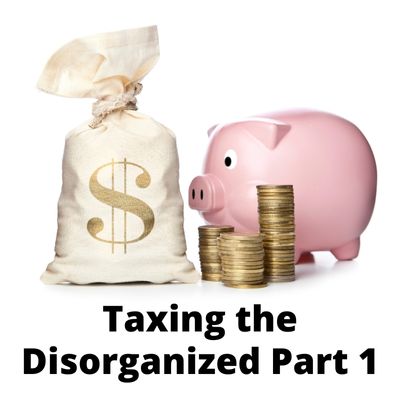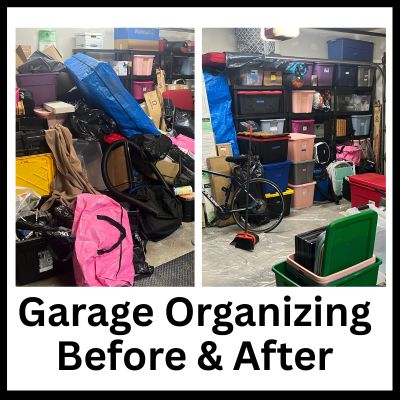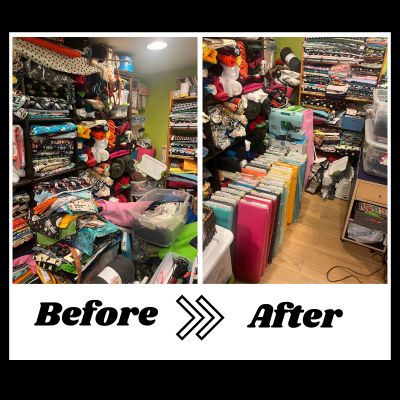Taxing the Disorganized Part 1

I was recently reading a book that talked about how “mail-in rebates” are like a tax for the disorganized. Companies advertise an alluring price reduction to capture a sale. When consumers look carefully at the fine print, they realize the tedious process they would have to go through to get their money back. The fine print reveals how companies purposefully make mail-in rebates difficult to follow through so that they don’t have to pay back what they promised. This made me think of all of the other ways disorganized people are “taxed”. There are so many ways that I decided to break this blog post up into two parts.
- Late or Missed Appointments
Remembering appointments can be very challenging for people who are disorganized. For some of my clients, this is our first lesson together. Late or missed appointments usually result in some sort of a late fee, or paying for the entire cost of the missed appointment. Remembering an appointment means writing down when the appointment is (in a paper or digital calendar, or both) and not losing (or spilling something on) whatever device or calendar it was written down on. It requires not scheduling anything else during that time, and also blocking out travel time. It requires regularly looking at the calendar to see what’s on the agenda for the day. It also requires setting an alarm or other type of reminder to remember to get ready and leave for the appointment. If it’s an in-person appointment, it usually requires making sure gas is in the car, and knowing where the keys are. Making sure to leave on time requires planning and executing all the things that need to happen before the appointment such as preparing paperwork, taking the kids to school, walking the dog, showering, getting something to eat, etc. This is no small feat!
- Late fees/Credit Card Interest Rates
Paying bills on time can be tough. Someone would need to keep track of their finances well enough to have enough money in the bank to pay the bill. If paying by check, they need to know where their checkbook is, and to make sure there is enough money in the correct account. They also need to remember to pay the bill in a timely matter. Late fees are common amongst people who are disorganized. Credit card interest fees can add up quickly!
- Impulse Buying and Reckless Spending
While it’s great to spend resources with confidence that they will return (as opposed to having a lack mindset and having fear when spending money), making impulsive or reckless decisions when spending money usually leads to financial challenges. It can be tricky to know if purchases are made impulsively or recklessly though. Sometimes it may look like a purchase was made recklessly, but it was actually made with care. The only way to really ensure that your purchases are made with care rather than impulsively or recklessly is to take very good care of your emotional health. Learn how to manage your emotions in a healthy manner so that your purchases won’t land you in the poor house. Emotional regulation can be challenging for people who are disorganized, since emotional regulation is an executive functioning skill.
- Returns
Remembering to return unwanted store or internet-bought items can be tough. The item either needs to be taken back to the store, or mailed back. To mail a return back, one must print out the return label, package the item back up, and then take it to the post office. Quite often, when I’m helping people declutter, an item comes up that should have been returned. It’s now far past the return deadline (even for store credit) and can’t be returned. When items are inexpensive, it’s not a big deal to just donate them. But for the more expensive items, it can bring up feelings of guilt, shame, and regret. Selling things requires another set of organizational skills that many people who are burdened with too much stuff are not willing to do.
- Forgetting Where Things Are and Having To Buy More
Another very common scenario amongst people who are disorganized is that they forget where they put something (or forget that they have it) and buy more. Not only does this impact someone’s wallet, the duplicate items add to the clutter and confusion. Similar to this is forgetting to bring things (on trips, for example) and having to buy more.
- Lost Money
There is a website called Unclaimed Money which can help people recover money that haven’t collected yet. Examples of unclaimed money are paychecks that were never cashed, bank accounts that have been forgotten about and closed, and even contents of safety deposit boxes. Cash can also be lost by being disorganized with it at home, or it can be dropped accidentally. I have helped more than one client who hasn’t realized that they have thrown cash out in the trash, and I discover it for them while I’m taking the trash out.
- Re-Occurring Subscriptions
In the digital age, it’s so easy to sign up for an online membership or streaming service that gets renewed automatically. If people aren’t checking their bank statements on a regular basis, months could go by without someone noticing that they are getting charged for something that they’re not using anymore. Subscription boxes like BirchBox and KiwiCo are examples of physical products that get sent to someone’s house at regular intervals. While it may be fun to get a surprise present in the mail from a subscription box, the price and the clutter can add up quick! Amazon “Subscribe and Save” is yet another example of a service that can contribute to excess in the home.
Stay tuned for next week when I post Taxing the Disorganized Part 2! If you’d like to contribute a way disorganized people are taxed to my next blog post, let me know in the comments!

By Jean Prominski, Certified Professional Organizer
Don’t forget to sign up for my organizing classes here
Download my free 5 week journal The Seattle Sparkle Method to Get Organized and Stay Organized
Sign up for my free 4 Day Color to Declutter Challenge.
Become part of a like-minded community by joining my Facebook Group, Declutter and Organize with Seattle Sparkle.
Ready to book a consultation? Complete this form.
For artwork to energize your home, order through jeanprominski.com or on Etsy.




